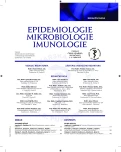Fecal bacteriotherapy for the treatment of recurrent Clostridium difficile colitis used in the Clinic of Infectious Diseases of the University Hospital Brno in 2010–2014 – a prospective study
Authors:
P. Polák 1,2,3; M. Freibergerová 1; P. Husa 1,2; J. Juránková 3,4; R. Svačinka 2; L. Mikešová 2; H. Kocourková 2; M. Mihalčin 1,2; R. Skalická 2; R. Stebel 1,2; M. Porubčanová 1,2
Authors‘ workplace:
Lékařská fakulta Masarykovy univerzity Brno
1; Klinika infekčních chorob, Fakultní nemocnice Brno
2; Oddělení klinické hematologie, Fakultní nemocnice Brno
3; Oddělení klinické mikrobiologie, Fakultní nemocnice Brno
4; Katedra laboratorních metod, Lékařská fakulta Masarykovy univerzity Brno
5
Published in:
Epidemiol. Mikrobiol. Imunol. 64, 2015, č. 4, s. 232-235
Category:
Original Papers
Overview
Introduction:
The aim of the study is to assess the efficacy of fecal bacteriotherapy in the treatment of Clostridium difficile colitis.
Materials and methods:
A prospective study of fecal bacteriotherapy in 80 adult patients hospitalized in the Clinic of Infectious Diseases, University Hospital Brno between 1 January 2010 and 31 December 2014.
Results:
During the study period, 80 patients were treated with fecal bacteriotherapy. The majority of the study group received fecal bacteriotherapy via a nasojejunal tube (n=78) and two patients via a rectal enema. Six patients were instilled with 20 g of feces, with a success rate of 50 %. The outcomes of nine patients were unevaluable. In the rest of 65 patients, the success rate with 40 g of feces was 83.1 %. There were no severe adverse events or mortality associated with fecal bacteriotherapy.
Conclusions:
Fecal bacteriotherapy is a safe and effective treatment modality in Clostridium difficile colitis.
Keywords:
Clostridium difficile colitis – recurrence – fecal bacteriotherapy
Sources
1. Bakken JS. Fecal bacteriotherapy for recurrent Clostridium difficile infection. Anaerobe, 2009;15(6):285–289.
2. Beneš J, Husa P, Nyč O, Polívková S. Doporučený postup diagnostiky a léčby kolitidy vyvolané Clostridium difficile. Klin Mikrobiol Inf Lek., 2014;20(2):56–66.
3. Brace C, Gloor GB, Ropeleski M, Allen-Vercoe E, Petrof EO. Microbial composition analysis of Clostridium difficile infections in an ulcerative colitis patient treated with multiple fecal microbiota transplantations. J Crohns Colitis, 2014;8(9):1133–1137.
4. Cammarota G, Ianiro G, Gasbarrini A. Fecal microbiota transplantation for the treatment of Clostridium difficile infection: a systematic review. J Clin Gastroenterol, 2014;48(8):693–702.
5. Emanuelsson F, Claesson BE, Ljungström L, Tvede M, Ung KA. Faecal microbiota transplantation and bacteriotherapy for recurrent Clostridium difficile infection: a retrospective evaluation of 31 patients. Scand J Infect Dis, 2014;46(2):89–97.
6. Floch MH. Fecal bacteriotherapy, fecal transplant, and the microbiome. J Clin Gastroenterol, 2010;44(8):529–530.
7. Gens KD, Elshaboury RH, Holt JS. Fecal microbiota transplantation and emerging treatments for Clostridium difficile infection. J Pharm Pract, 2013;26(5):498–505.
8. Gough E, Shaikh H, Manges AR. Systematic review of intestinal microbiota transplantation (fecal bacteriotherapy) for recurrent Clostridium difficile infection. Clin Infect Dis, 2011;53(10):994–1002.
9. Karadsheh Z, Sule S. Fecal transplantation for the treatment of recurrent Clostridium difficile infection. N Am J Med Sci, 2013;5(6):339–343.
10. Kelly CR, de Leon L, Jasutkar N. Fecal microbiota transplantation for relapsing Clostridium difficile infection in 26 patients: methodology and results. J Clin Gastroenterol, 2012;46(2):145–149.
11. Khoruts A, Dicksved J, Jansson JK, Sadowsky MJ. Changes in the composition of the human fecal microbiome after bacteriotherapy for recurrent Clostridium difficile-associated diarrhea. J Clin Gastroenterol, 2010;44(5):354–360.
12. Kohout P, Vejmelka J. Fekální bakterioterapie v léčbě recidivující klostridiové enterokolitidy. Postgrad Med, 2014;16(7):729–734.
13. Mellow MH, Kanatzar A. Colonoscopic fecal bacteriotherapy in the treatment of recurrent Clostridium difficile infection – results and follow-up. J Okla State Med Assoc, 2011;104(3):89–91.
14. Petrof EO, Gloor GB, Vanner SJ, Weese SJ, Carter D, Daigneault MC, et al. Stool substitute transplant therapy for the eradication of Clostridium difficile infection: 'RePOOPulating' the gut. Microbiome, 2013;1(1):3.
15. Polák P, Freibergerová M, Juránková J, Kocourková H, Mikešová L, Svačina R, et al. První zkušenosti s fekální bakterioterapií v léčbě relabující pseudomembranózní kolitidy způsobené Clostridium difficile. Klin Mikrobiol Inf Lek, 2011;17(6):214–217.
16. Rohlke F, Stollman N. Fecal microbiota transplantation in relapsing Clostridium difficile infection. Therap Adv Gastroenterol, 2012;5(6):403–420.
17. Sofi AA, Silverman AL, Khuder S, Garborg K, Westerink JM, Nawras A. Relationship of symptom duration and fecal bacteriotherapy in Clostridium difficile infection-pooled data analysis and a systematic review. Scand J Gastroenterol, 2013;48(3):266–273.
18. Suwantarat N, Bobak DA. Fecal bacteriotherapy for recurrent Clostridium difficile infection: what's old is new again? Curr Infect Dis Rep, 2013;15(2):101–113.
19. Vojtilová L, Freibergerová M, Juránková J, et al. Epidemiological factors influencing the development of relapsing and severe Clostridium difficile infection. Epidemiol Mikrobiol Imunol, 2014;63(1):27–35.
Labels
Hygiene and epidemiology Medical virology Clinical microbiologyArticle was published in
Epidemiology, Microbiology, Immunology

2015 Issue 4
-
All articles in this issue
- Real-time PCR detection of Neisseria meningitidis, Haemophilus influenzae, and Streptococcus pneumoniae DNA in clinical specimens
- Fecal bacteriotherapy for the treatment of recurrent Clostridium difficile colitis used in the Clinic of Infectious Diseases of the University Hospital Brno in 2010–2014 – a prospective study
- Benign acute childhood myositis as a complication of influenza B and its differential diagnosis
- Mumps outbreak in the Plzeň Region in 2011
- The role of Streptococcus mutans in the oral biofilm
- Human hantavirus diseases – still neglected zoonoses?
- Immune response in the pathogenesis of hepatitis C virus infection
- Tick-borne encephalitis – pathogenesis and therapeutic approaches
- Toxic shock syndrome
- Epidemiology, Microbiology, Immunology
- Journal archive
- Current issue
- About the journal
Most read in this issue
- Benign acute childhood myositis as a complication of influenza B and its differential diagnosis
- Human hantavirus diseases – still neglected zoonoses?
- Toxic shock syndrome
- The role of Streptococcus mutans in the oral biofilm
